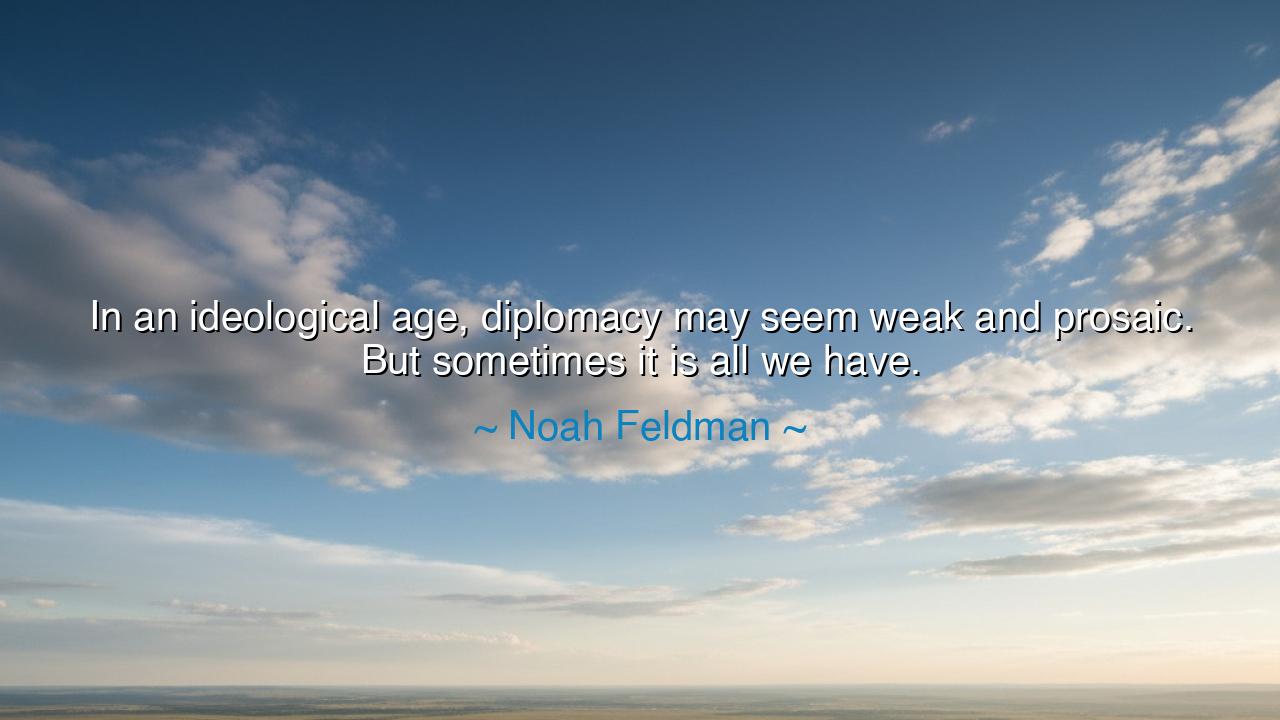
In an ideological age, diplomacy may seem weak and prosaic. But
In an ideological age, diplomacy may seem weak and prosaic. But sometimes it is all we have.






“In an ideological age, diplomacy may seem weak and prosaic. But sometimes it is all we have.” — Noah Feldman
Thus spoke Noah Feldman, scholar of law and historian of empires, whose words pierce the illusions of power with the calm precision of a philosopher. In this single sentence, he reminds humanity of a truth too easily forgotten — that in times of ideology, when passion blinds reason and righteousness hardens into fanaticism, the art of diplomacy becomes both fragile and sacred. For while ideology divides the world into absolutes — us and them, good and evil, truth and lies — diplomacy dwells in the gray spaces in between, where peace must be patiently built, word by word, hand by hand.
Feldman speaks as one who has studied the rise and fall of nations, who knows that every age of belief is also an age of conflict. When the fires of conviction burn too brightly, compromise seems treason, and conversation seems weakness. Yet, he warns us that the alternative — the abandonment of dialogue — leads only to ruin. Diplomacy, though often dismissed as dull or cautious, is the last remaining bridge when others have been burned by pride and zeal. It is the language of the sane amidst the shouting of the righteous. In an age of ideology, when each faction sees itself as the bearer of ultimate truth, to speak diplomatically is an act not of cowardice, but of courage.
History bears witness to this lesson. Consider the Cold War, when two titanic powers, the United States and the Soviet Union, faced one another across the abyss of nuclear annihilation. Each was armed not only with weapons, but with belief — each certain that its way of life represented salvation for the world. Yet it was not conquest that preserved humanity, but diplomacy — cautious, slow, unglamorous, yet relentless. The world was spared not by the roar of armies, but by the whispers of negotiators, by the careful crafting of treaties like the SALT agreements and the tireless efforts of those who chose dialogue over destruction.
In this, Feldman’s wisdom echoes that of the ancients. The philosopher Plato once wrote that “wise men speak because they have something to say; fools speak because they must say something.” Diplomacy is the speech of the wise — measured, deliberate, seeking not victory but understanding. The great statesmen of history, from Metternich after Napoleon’s fall to the peacemakers of postwar Europe, all knew that diplomacy’s power lies not in spectacle but in endurance. It does not shout its triumphs, but its silence often saves nations.
And yet, the ideological age is not confined to politics. It pervades every corner of human life — religion, culture, technology, even art. In such times, Feldman’s insight becomes a lesson for the individual as much as for the state. When people cling so tightly to their beliefs that they can no longer listen, when debate becomes war and difference becomes enmity, the spirit of diplomacy — patience, empathy, restraint — is the only path back to peace. To practice diplomacy in one’s own life is to be a healer of divides, a restorer of harmony amidst noise and division.
Feldman’s lament is also a call to humility. He reminds us that the tools of peace are often unglamorous — negotiation, moderation, compromise — yet they are the only ones that can sustain civilization. The warriors and zealots write history in fire, but it is the diplomats who rebuild the world when the fires die out. To dismiss diplomacy as weak is to mistake gentleness for frailty, and patience for surrender. For the diplomat’s strength lies not in force, but in faith — faith in the possibility of reason amidst chaos.
Practical counsel for the seeker:
-
In moments of conflict, listen before you speak, for understanding is the root of peace.
-
Do not mistake passion for truth; even the righteous must yield when dialogue demands it.
-
Practice diplomacy in small things — in family, in work, in community — for peace between nations begins with peace between souls.
-
Remember that compromise is not cowardice; it is the craft of survival.
For as Noah Feldman teaches, when ideologies clash and tempers rise, diplomacy may seem frail — yet it endures when all else fails. It is the last light in the darkness, the bridge built by human hands across the gulf of hatred. In times when the world seems consumed by noise and certainty, let us honor the quiet strength of those who choose dialogue over division. For sometimes, indeed, it is all we have — and all that keeps us human.






AAdministratorAdministrator
Welcome, honored guests. Please leave a comment, we will respond soon